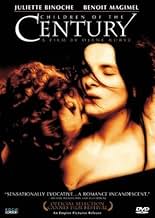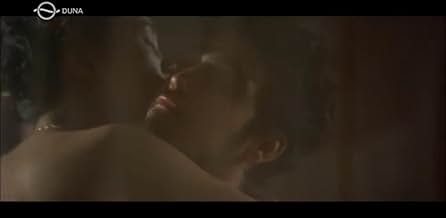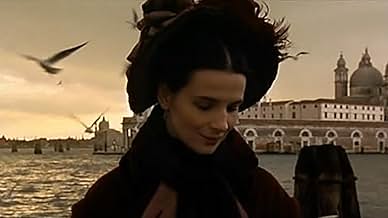VALUTAZIONE IMDb
6,5/10
2091
LA TUA VALUTAZIONE
Una storia di passione condannata tra due geniali scrittori del XIX secolo: tra la scrittrice di romanzi George Sand e il poeta Alfred de Musset.Una storia di passione condannata tra due geniali scrittori del XIX secolo: tra la scrittrice di romanzi George Sand e il poeta Alfred de Musset.Una storia di passione condannata tra due geniali scrittori del XIX secolo: tra la scrittrice di romanzi George Sand e il poeta Alfred de Musset.
- Regia
- Sceneggiatura
- Star
Victoire Thivisol
- Solange
- (as Victoire)
Recensioni in evidenza
If Romanticism, as a movement, can be defined as an "infinite longing" which combines passion and erotic tension with death, despair, and the cycles of nature, then Kurys film portrayal is aptly named and her protagonists--Alfred de Musset and Georges Sand--are indeed children of their century.
The key to understanding the point of this film is to think of it as a painting. It does not give you an insider's view of the relationship between these two literary giants; it does not break down their psychology; and you do not even understand why you, as an audience member, should like either of them. Yet their obsessive love was a monument for the first major artistic movement of the 19th century. Kurys paints them as Delacroix would--in all their lurid color, capturing the details of high emotion without explaining a thing. As painting on film, Les Enfants succeeds as wildly as any Romantic dreamscape and, thus, captures the mood of that era and the sentiment which spawned it more perfectly than 1,000 words on the subject.
The key to understanding the point of this film is to think of it as a painting. It does not give you an insider's view of the relationship between these two literary giants; it does not break down their psychology; and you do not even understand why you, as an audience member, should like either of them. Yet their obsessive love was a monument for the first major artistic movement of the 19th century. Kurys paints them as Delacroix would--in all their lurid color, capturing the details of high emotion without explaining a thing. As painting on film, Les Enfants succeeds as wildly as any Romantic dreamscape and, thus, captures the mood of that era and the sentiment which spawned it more perfectly than 1,000 words on the subject.
I saw this film in French with Spanish subtitles so I had to read very fast! The photography is beautiful. I had not seen either of the principal actors before but I will look for them again. Miss Binoche made George Sand a real person not just an odd woman! The actor who played Alfred de Musset, showed him as charming but weak, very well done.
"Enfants du siècle" does'nt really mean "Children of the Century", as for the contemporaries it was obvious that it meant "Heirs of the Napoleonic Saga".
This generation, Hugo, Dumas,, Musset, Nerval, Lamartine and Vigny was obsessed by the sad perception that they could not lead the heroïc, larger than life existence experienced by their fathers during the Revolution and Empire - a period (or shortly thereafter) during which they were born. They - and Aurore Dupin de Francueil (aka George Sand) with them - sought vicariously to find fame and glory in literature, particularly in theatre which was the « 7th art » of those days, and in forms of "original living" which would not surprise those reading now on the antics of 'world famous' people. In those days, that was called « Romantism ».
All of them succeeded in literature; but - even though in those days novels, essays, tales, and poems were keenly read - theatre was the big thing: a kind of Hollywood on Seine! And the successful theatre writers and performers had a fame akin to that of our Hollywood stars of today.
So this film should be seen as the biopic of two larger than life "Hollywood stars".
No surprise that passions, drugs, unfaithfulnesses and manifestations of an enormous ego are sprinkled liberally in this film. One may think of the Burton and Taylor duet, but with a wittier and more intellectual bent.
Musset, fabulously talented, has left immortal poems and several theatre pieces which have been rediscovered in the XXth century and which will last; but he has sadly wasted his talent in alcohol (absinthe mainly), drugs and philandering, prostitutes included; he died at 47.
Sand has been the more resilient of the two. She died at 71, a busy grandmother fond of country life, a true precursor of the cause of women's freedom in terms of choosing her (sometimes Saphic) lovers, espousing political causes, and communing with nature.
Sand's "original" life is her real masterpiece; it has a very modern tone. Her writings are numerous and charming, but for me, the literary genius of the two is Musset: most of his writings are masterpieces, even though his life has been a shambles.
It is no surprise then that Diane Kurys takes Sand as her lead character, against a despondent and weak Musset. And I quite understand why - to some reviewers - they both appear boorish, selfish and inspiring few sympathy. But - keeping in mind that Musset and Sand ooze talent and are their generation's Hollywood superstars - you may enjoy this well crafted biopic.
___ .
This generation, Hugo, Dumas,, Musset, Nerval, Lamartine and Vigny was obsessed by the sad perception that they could not lead the heroïc, larger than life existence experienced by their fathers during the Revolution and Empire - a period (or shortly thereafter) during which they were born. They - and Aurore Dupin de Francueil (aka George Sand) with them - sought vicariously to find fame and glory in literature, particularly in theatre which was the « 7th art » of those days, and in forms of "original living" which would not surprise those reading now on the antics of 'world famous' people. In those days, that was called « Romantism ».
All of them succeeded in literature; but - even though in those days novels, essays, tales, and poems were keenly read - theatre was the big thing: a kind of Hollywood on Seine! And the successful theatre writers and performers had a fame akin to that of our Hollywood stars of today.
So this film should be seen as the biopic of two larger than life "Hollywood stars".
No surprise that passions, drugs, unfaithfulnesses and manifestations of an enormous ego are sprinkled liberally in this film. One may think of the Burton and Taylor duet, but with a wittier and more intellectual bent.
Musset, fabulously talented, has left immortal poems and several theatre pieces which have been rediscovered in the XXth century and which will last; but he has sadly wasted his talent in alcohol (absinthe mainly), drugs and philandering, prostitutes included; he died at 47.
Sand has been the more resilient of the two. She died at 71, a busy grandmother fond of country life, a true precursor of the cause of women's freedom in terms of choosing her (sometimes Saphic) lovers, espousing political causes, and communing with nature.
Sand's "original" life is her real masterpiece; it has a very modern tone. Her writings are numerous and charming, but for me, the literary genius of the two is Musset: most of his writings are masterpieces, even though his life has been a shambles.
It is no surprise then that Diane Kurys takes Sand as her lead character, against a despondent and weak Musset. And I quite understand why - to some reviewers - they both appear boorish, selfish and inspiring few sympathy. But - keeping in mind that Musset and Sand ooze talent and are their generation's Hollywood superstars - you may enjoy this well crafted biopic.
___ .
Wonderful mise-en-scene of a true passion that turned out to a, damaging love to hate you syndrome especially for Musset. Georges and Musset, they can't do with nor without each other. Their love was the spring of their inspiration that triggered their talent but the problem was that this love could feed only one's inspiration at a time.
Wonderful pictures, acting and especially costume design capture us in the late 1880's France which was a very nice experience.
Wonderful pictures, acting and especially costume design capture us in the late 1880's France which was a very nice experience.
Diane Kury's oppulent film is a mixed bag. In it's favour it features
real life lovers Juliette Binoche and Benoît Magimel on excellent
form. As Alfred de Musset Magimel gives us a young man
completely out of his mind on a cocktail of opium and absinthe. A
man deeply creative and talented, but unable to function as a
human being. Binoche's George Sand is a strong a determined
woman. The scene where she finds that Musset may die after
overdosing is wonderfully performed with passion and grandeur.
The film comes alive in her eyes. As filmed by Vilko Filac and
dressed by Christian La Croix, Binoche has never looked more
beautiful or sensual.
However Kurys' direction and her screenplay, co-written by
Francois Olivier Rousseau and Murray Head, lacks direction and
understanding of her period. The brothel scenes are particularly
over the top. Yet her direction of her actor is magnificent.
What is missing from Kurys' film most of all however is Sand and
Musset as writers, as creative masters. There is no sense of their
value in the film beyond their doomed love affair.
Les Enfants du Siecle is a mixed bag, but certainly worth a look.
real life lovers Juliette Binoche and Benoît Magimel on excellent
form. As Alfred de Musset Magimel gives us a young man
completely out of his mind on a cocktail of opium and absinthe. A
man deeply creative and talented, but unable to function as a
human being. Binoche's George Sand is a strong a determined
woman. The scene where she finds that Musset may die after
overdosing is wonderfully performed with passion and grandeur.
The film comes alive in her eyes. As filmed by Vilko Filac and
dressed by Christian La Croix, Binoche has never looked more
beautiful or sensual.
However Kurys' direction and her screenplay, co-written by
Francois Olivier Rousseau and Murray Head, lacks direction and
understanding of her period. The brothel scenes are particularly
over the top. Yet her direction of her actor is magnificent.
What is missing from Kurys' film most of all however is Sand and
Musset as writers, as creative masters. There is no sense of their
value in the film beyond their doomed love affair.
Les Enfants du Siecle is a mixed bag, but certainly worth a look.
Lo sapevi?
- QuizGeorge Sand's estate loaned the production some of Sand's jewelry, including a sapphire ring, which Juliette Binoche wears throughout the film.
- Citazioni
George Sand: Love does exist, it's not an illusion. One merely has to recognise it, and be humble before it.
- Versioni alternativeThe original French theatrical version, which runs at 135 mins begins as Sand plans to leave her husband and Musset's father dies. This version continues after their final meeting as Sand begins to write her story and attempts in vain to see Musset one last time. This version ends with a direct to camera address by Sand at Musset's tomb. A shorter theatrical version was released in Germany, Spain, UK and US which begins with Sand reading from "Lélia" and ends with Sand and Musset's final meeting. It runs at 105 mins. This version contains two new scenes: Sand and Musset being introduced to each other and a dance sequence. However the opening sequences featuring Sands arrival in Paris during an uprising and her relationship with Marie Dorval are lost, as are the closing scenes as she attempts to see Musset a final time. Most DVD releases have favored the Original 135 min version which was more critically popular.
- ConnessioniVersion of L'eterna armonia (1945)
I più visti
Accedi per valutare e creare un elenco di titoli salvati per ottenere consigli personalizzati
- How long is Children of the Century?Powered by Alexa
Dettagli
- Data di uscita
- Paese di origine
- Sito ufficiale
- Lingua
- Celebre anche come
- Children of the Century
- Luoghi delle riprese
- Aziende produttrici
- Vedi altri crediti dell’azienda su IMDbPro
Botteghino
- Lordo Stati Uniti e Canada
- 56.611 USD
- Fine settimana di apertura Stati Uniti e Canada
- 8044 USD
- 15 set 2002
- Lordo in tutto il mondo
- 381.624 USD
- Tempo di esecuzione
- 2h 15min(135 min)
- Colore
- Mix di suoni
- Proporzioni
- 2.35 : 1
Contribuisci a questa pagina
Suggerisci una modifica o aggiungi i contenuti mancanti
































